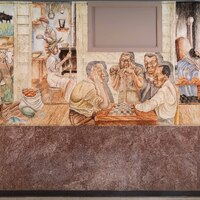Untitled mural by Charles Ross

Charles Ross’s mural features a direct view of a Black family's rural home life. On the left side, two men in overalls and hats are ranching cattle alongside a country home. Staple Southern crops including yams, watermelons, and corn are stacked on the house’s porch. In the middle of the porch, a group of four weary older men are sitting around a table playing a game of checkers. Above the men’s heads is a greyish/beige panel. At the time of the mural’s painting, the panel was a transom window, looking into the office on the other side of the wall. This would have provided the visual effect of a window looking into the house. The interior of the house is visible in the background of the mural. The left side of the house is the kitchen. Two women wearing headwraps are at work; one woman is standing and appears to be cooking while the other is sitting on a stool, churning butter. On the right side, a child, who is perhaps ill, is laying in a bed and being attended to by a woman wearing a dress. Ross’s composition captures a broad range of domestic activities.
Ross’s mural may capture scenes reminiscent of the artist’s upbringing. Charles Ross grew up in Huntsville, Texas, a semi-rural city north of Houston, most notable for being the site of a state penitentiary. In 1960, when Ross would have been a young boy, the city’s population was just under 12,000. It’s entirely plausible that Ross grew up in a home just like the one pictured in this mural. Just down the hall on the third floor, Ross painted another mural featuring cattle, horses, birds, and train tracks across multiple panels. This mural also speaks to gendered division of labor. The piece seems to mark a division between domestic labor, as the domain of women, and agricultural labor, as the work of men. Ross’s composition also visually places women and their work in the background of the mural. This may be a clever reference to how women’s labor is often pushed to the margins of society and goes unnoticed and unappreciated.
This program is made possible in part by a grant from Humanities Texas, the state affiliate of the National Endowment for the Humanities.
